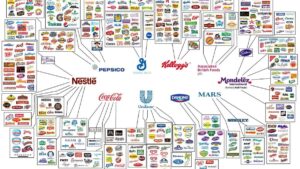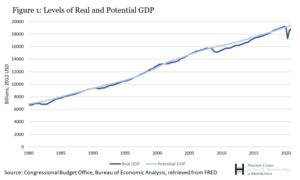I have now stumbled across two scholars who stated in no uncertain terms that extreme corporate consolidation directly led to fascism in the past.
Specifically in Germany in the 1930s.
In the book, The Myth of Capitalism:
A few months earlier, a report commissioned by Eisenhower concluced that the company [IG Farben] had been crucial to the German war effort. Without its manufacturing capacity and scientific ingenuity, Hitler could never have achieved what he did. It is difficult to understate the importance of concerntrated industry to the Nazi rise.
Tepper, Jonathan, and Denise Hearn. The Myth of Capitalism. Hoboken, New Jersey, John Wiley & Sons, 2019. p. 148
In the Podcast episode Less is More of The Prof G Podcast, Tim Wu is speaking:
We really need to relearn the lessons of Japan and Germany, and what they let happen. They were pretty much OK with the idea of big companies running government in collaboration with the, well not elected, but the government officials. That was cool. In Japan, in the 1920s and 30s, the major conglomerates even had their own political parties. They sort of took turns being in power. There was no line between government and private power. In Germany, they had this extraordinary confidence that they had solved things in a way better than Americans by promoting cooperation and cartels, and everyone’s going to be friends, we’ll put this all together. And both those ended pretty disasterously. I don’t think we need to explain why.
If you look at the Germany example, there is this key moment that I’ll focus on in German history, where Adolph Hitler had been elected, at least with a…. He didn’t have a majority, but he had a plurality of support, but he was starting to weaken, and there is every chance he could have been one of these sort of one term wonders. And in his hour of greatest need the concentrated Germany economy, the heavy industry decided, made a joint decision, that actually, they were done with democracy and they needed a strong leader like Hitler, who was going to bring Germany back to greatness. So, when you have corporations powerful enough that they can influence and support and save a figure and promote a strongman to power, often one who ironically, Hitler ran against monopoly and said I’m here for the common man and these companies are too powerful. But at the same time, made it clear that with him in charge it would be a good environment for the profitability, for the future prospects for the global expansion of German monolopy. That is the key moment when they decide that they’re on that side.
Galloway, Scott, and Tim Wu. “Less Is More.” The Prof G Podcast, uploaded by Google Podcasts, 30 July 2020, podcasts.google.com/feed/aHR0cHM6Ly9mZWVkcy5tZWdhcGhvbmUuZm0vV1dPNjY1NTg2OTIzNg/episode/NmEyMTgxODYtNzJjMi0xMWVhLWIyMzktOWZkNWE5MGMxYTI1?sa=X&ved=0CAUQkfYCahcKEwiwo8KN5vXzAhUAAAAAHQAAAAAQNQ.
You can listen to the full podcast episode using the link above, or if you prefer, you can listen to the 5:31 audio clip I pulled out of it, which is below.
Why is this relevant to us?
While the United States is not there today, a few things happened recently (in historical terms) that seem alarming.
- Corporate consolidation is at an extreme post WW2 high.
- Congress and our state lawmakers CLEARLY take their marching orders from corporate donors.
- Since the 1980s, the rewards of the productivity gains of our econonmy have gone disproportionatly to the wealthiest Americans.
- People are pissed about that.
- We took steps towards authoritarianism with the Presidency of Donald Trump.
I’d like to suggest now is a good time to learn about how anger at widespread economic inequality and extreme corporate consolidation in post-WW2 Germany paved the way for rising of outright fascism.



